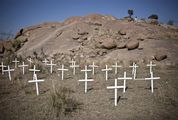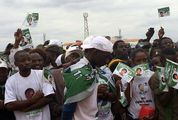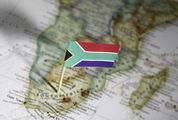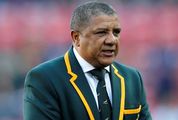Russia backs restricted ceasefire in besieged Aleppo
by Stephanie Nebehay
2016-08-18 23:06:44.0
GENEVA — Russia said on Thursday it would support a 48-hour ceasefire in Aleppo, a move the UN Syria envoy said would allow aid to reach besieged areas soon, as long as all sides respect the temporary truce.
As pictures of a dazed child pulled from the rubble in heavily bombarded rebel-held eastern Aleppo captured the plight of the city’s civilians, Moscow said it was ready to start the first "humanitarian pause" next week.
Western diplomats gave cautious welcome to the announcement, while raising questions about Moscow’s motives and stressing the United Nations must be in charge of a sustained aid operation.
UN Special Envoy Staffan de Mistura has long called for a 48-hour halt in fighting each week to allow aid delivery and medical evacuations from both rebel-held eastern and government-controlled western Aleppo.
He welcomed the Russian defence ministry announcement and said the UN humanitarian team "is now set to mobilise itself to respond to this challenge". "Our plan is to collectively work out the operational details, and be ready for delivery as soon as possible," de Mistura’s office said in a statement.
Moscow must ensure its allied Syrian government forces adhere to the pause, while the US and regional powers must ensure opposition fighters are also on board, he said.
"The challenge will be in operational arrangements and making sure there is a real pause in fighting and that it (Russia) is not using this for its own strategic advantage and gathering forces for another offensive," one Western diplomat said.
"It’s no surprise this has come at a time when the rebels have managed to break through the besiegement of Aleppo and establish their own corridor."
Aleppo, Syria’s most populous pre-war city and its commercial hub, has become the focus of fighting in the five-year-old civil war. Up to 2-million people on both sides lack clean water after infrastructure was damaged in bombing.
Escalating violence there, where Russia and Iran are supporting bombing campaigns against the rebels, some of whom are backed by Arab and Western powers, has caused the breakdown of Geneva peace talks overseen by de Mistura.
The Syrian opposition has said it wants to see a credible pause in the bloodshed and improved humanitarian aid access before peace talks can resume.
"Trucks with food, water and medicine are ready to move immediately and ambulances to evacuate urgent medical cases are on standby," said Jens Laerke, spokesman for the UN Office for the Coordination of Humanitarian Affairs.
Another Western diplomat said it was important for the UN to lead the aid effort.
"It is not a Russian operation, it has to be a UN operation to be a good and credible operation," he said.
"It would start at the beginning of next week on condition that there is an agreement between the U.N., Russia and the (Syrian) regime on modalities." In Berlin, a German diplomat told Reuters that Moscow had a special responsibility to guarantee that hostilities in Aleppo did not escalate further ahead of a ceasefire.
Reuters
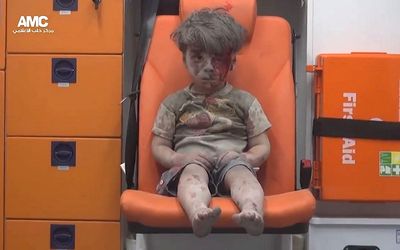
An injured child, named as Omar Daqneesh, awaits treatment in an ambulance after an air strike in Aleppo, Syria, on Wednesday. Picture: EPA/ALEPPO MEDIA CENTER
GENEVA — Russia said on Thursday it would support a 48-hour ceasefire in Aleppo, a move the UN Syria envoy said would allow aid to reach besieged areas soon, as long as all sides respect the temporary truce.
As pictures of a dazed child pulled from the rubble in heavily bombarded rebel-held eastern Aleppo captured the plight of the city’s civilians, Moscow said it was ready to start the first "humanitarian pause" next week.
Western diplomats gave cautious welcome to the announcement, while raising questions about Moscow’s motives and stressing the United Nations must be in charge of a sustained aid operation.
UN Special Envoy Staffan de Mistura has long called for a 48-hour halt in fighting each week to allow aid delivery and medical evacuations from both rebel-held eastern and government-controlled western Aleppo.
He welcomed the Russian defence ministry announcement and said the UN humanitarian team "is now set to mobilise itself to respond to this challenge". "Our plan is to collectively work out the operational details, and be ready for delivery as soon as possible," de Mistura’s office said in a statement.
Moscow must ensure its allied Syrian government forces adhere to the pause, while the US and regional powers must ensure opposition fighters are also on board, he said.
"The challenge will be in operational arrangements and making sure there is a real pause in fighting and that it (Russia) is not using this for its own strategic advantage and gathering forces for another offensive," one Western diplomat said.
"It’s no surprise this has come at a time when the rebels have managed to break through the besiegement of Aleppo and establish their own corridor."
Aleppo, Syria’s most populous pre-war city and its commercial hub, has become the focus of fighting in the five-year-old civil war. Up to 2-million people on both sides lack clean water after infrastructure was damaged in bombing.
Escalating violence there, where Russia and Iran are supporting bombing campaigns against the rebels, some of whom are backed by Arab and Western powers, has caused the breakdown of Geneva peace talks overseen by de Mistura.
The Syrian opposition has said it wants to see a credible pause in the bloodshed and improved humanitarian aid access before peace talks can resume.
"Trucks with food, water and medicine are ready to move immediately and ambulances to evacuate urgent medical cases are on standby," said Jens Laerke, spokesman for the UN Office for the Coordination of Humanitarian Affairs.
Another Western diplomat said it was important for the UN to lead the aid effort.
"It is not a Russian operation, it has to be a UN operation to be a good and credible operation," he said.
"It would start at the beginning of next week on condition that there is an agreement between the U.N., Russia and the (Syrian) regime on modalities." In Berlin, a German diplomat told Reuters that Moscow had a special responsibility to guarantee that hostilities in Aleppo did not escalate further ahead of a ceasefire.
Reuters


